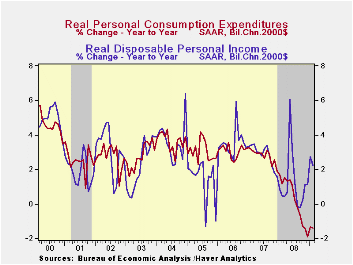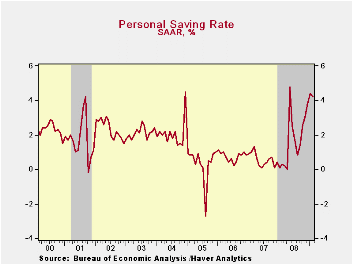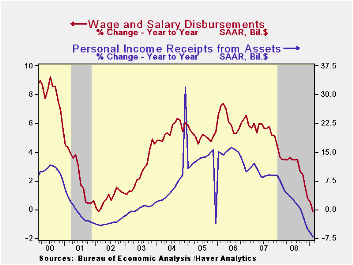 Global| Mar 27 2009
Global| Mar 27 2009U.S. Personal Spending Increases Again, Modestly
by:Tom Moeller
|in:Economy in Brief
Summary
Consumer spending is recovering from its swoon this past Fall. The U.S. Bureau of Economic Analysis reported that personal spending during February logged its second increase after six consecutive monthly declines. That recovery is [...]
 Consumer
spending is recovering from its swoon this past Fall. The U.S. Bureau
of Economic Analysis reported that personal spending during February
logged its second increase after six consecutive monthly declines. That
recovery is hardly robust however. Adjusted for inflation, spending in
fact fell 0.2% last month after January's 0.7% rise. For the quarter so
far, real spending is up at just a 1.3% annual rate which makes up
little of the 4.3% rate of decline during 4Q and the 3.8% 3Q drop.
Consumer
spending is recovering from its swoon this past Fall. The U.S. Bureau
of Economic Analysis reported that personal spending during February
logged its second increase after six consecutive monthly declines. That
recovery is hardly robust however. Adjusted for inflation, spending in
fact fell 0.2% last month after January's 0.7% rise. For the quarter so
far, real spending is up at just a 1.3% annual rate which makes up
little of the 4.3% rate of decline during 4Q and the 3.8% 3Q drop.
Much of the recovery in overall real spending this quarter traces to
the modest, halting rise in spending on autos, after an abysmal Fall.
Real spending on autos & parts fell 3.9% last month retracing
most of a 5.3% January increase. This flatness follows declines at 10%
to 40% annual rates during each quarter of 2008. Elsewhere, earlier
declines in real outlays indeed may be stabilizing as indicated by two
consecutive firm gains in furniture & appliances spending. But
that's about it for the good news. Real spending on apparel rose all of
0.4% last month after no change during January. It's still down 2.6%
year-to-year.  And real spending on services has been modest as well. It
declined 0.1% last month and has been flat since November (+0.7% y/y).
And real spending on services has been modest as well. It
declined 0.1% last month and has been flat since November (+0.7% y/y).
The pullback in personal spending reflects lower levels of personal income. Income declined 0.2% after a 0.2% January increase (that was half the initially reported gain) and is down 1.3% versus its peak last June. The latest decline about equaled the Consensus expectation. Also losing steam, disposable personal income slipped 0.1% after the 1.6% January surge that owed to a 9.7% monthly drop in taxes. Real disposable income also fell by 0.4% after January's gain of 1.3%. Despite the decline, real income increased 2.2% versus last year.
Wages & salaries further reflected the weak job market with a 0.4% decline (-0.2% y/y). So bad are the figures that wage income was down in each of the last four months and at a 4.0% annual rate during that period. That rate is the fastest since 1994. Private sector wages during that period were down at a 6.0% annual rate, also the worst since 1994. These declines contrast to wages in the government sector which continue to increase. A 0.3% February rise pulled wages up 5.1% versus last year.
 Lower interest rates continued
to pull interest income down. It has fallen 1.0% to 2.0% during each of
the last five months (-7.2% y/y). In addition, weak corporate profits
lowered dividend income by 1.5%, about the rate of decline since
September and down 7.2% year-to-year.
Lower interest rates continued
to pull interest income down. It has fallen 1.0% to 2.0% during each of
the last five months (-7.2% y/y). In addition, weak corporate profits
lowered dividend income by 1.5%, about the rate of decline since
September and down 7.2% year-to-year.
The stabilization of oil prices caused the PCE chain price index to rise 0.3% during the last two months. Core pricing power in fact firmed slightly showing two months of 0.2% increase after having been unchanged for two. The latest gain matched Consensus expectations.
The personal income & consumption figures are available in Haver's USECON and USNA databases.
| Disposition of Personal Income (%) | February | January | Y/Y | 2008 | 2007 | 2006 |
|---|---|---|---|---|---|---|
| Personal Income | -0.2 | 0.2 | 1.0 | 3.8 | 6.1 | 7.1 |
| Disposable Personal Income | -0.1 | 1.6 | 3.2 | 4.6 | 5.5 | 6.4 |
| Personal Consumption Expenditures | 0.2 | 1.0 | -0.4 | 3.6 | 5.5 | 5.9 |
| Saving Rate | 4.2 | 4.4 | 0.3 (Feb. 08) | 1.8 | 0.5 | 0.7 |
| PCE Chain Price Index | 0.3 | 0.3 | 1.0 | 3.3 | 2.6 | 2.8 |
| Less food & energy | 0.2 | 0.2 | 1.8 | 2.2 | 2.2 | 2.3 |
Tom Moeller
AuthorMore in Author Profile »Prior to joining Haver Analytics in 2000, Mr. Moeller worked as the Economist at Chancellor Capital Management from 1985 to 1999. There, he developed comprehensive economic forecasts and interpreted economic data for equity and fixed income portfolio managers. Also at Chancellor, Mr. Moeller worked as an equity analyst and was responsible for researching and rating companies in the economically sensitive automobile and housing industries for investment in Chancellor’s equity portfolio. Prior to joining Chancellor, Mr. Moeller was an Economist at Citibank from 1979 to 1984. He also analyzed pricing behavior in the metals industry for the Council on Wage and Price Stability in Washington, D.C. In 1999, Mr. Moeller received the award for most accurate forecast from the Forecasters' Club of New York. From 1990 to 1992 he was President of the New York Association for Business Economists. Mr. Moeller earned an M.B.A. in Finance from Fordham University, where he graduated in 1987. He holds a Bachelor of Arts in Economics from George Washington University.






